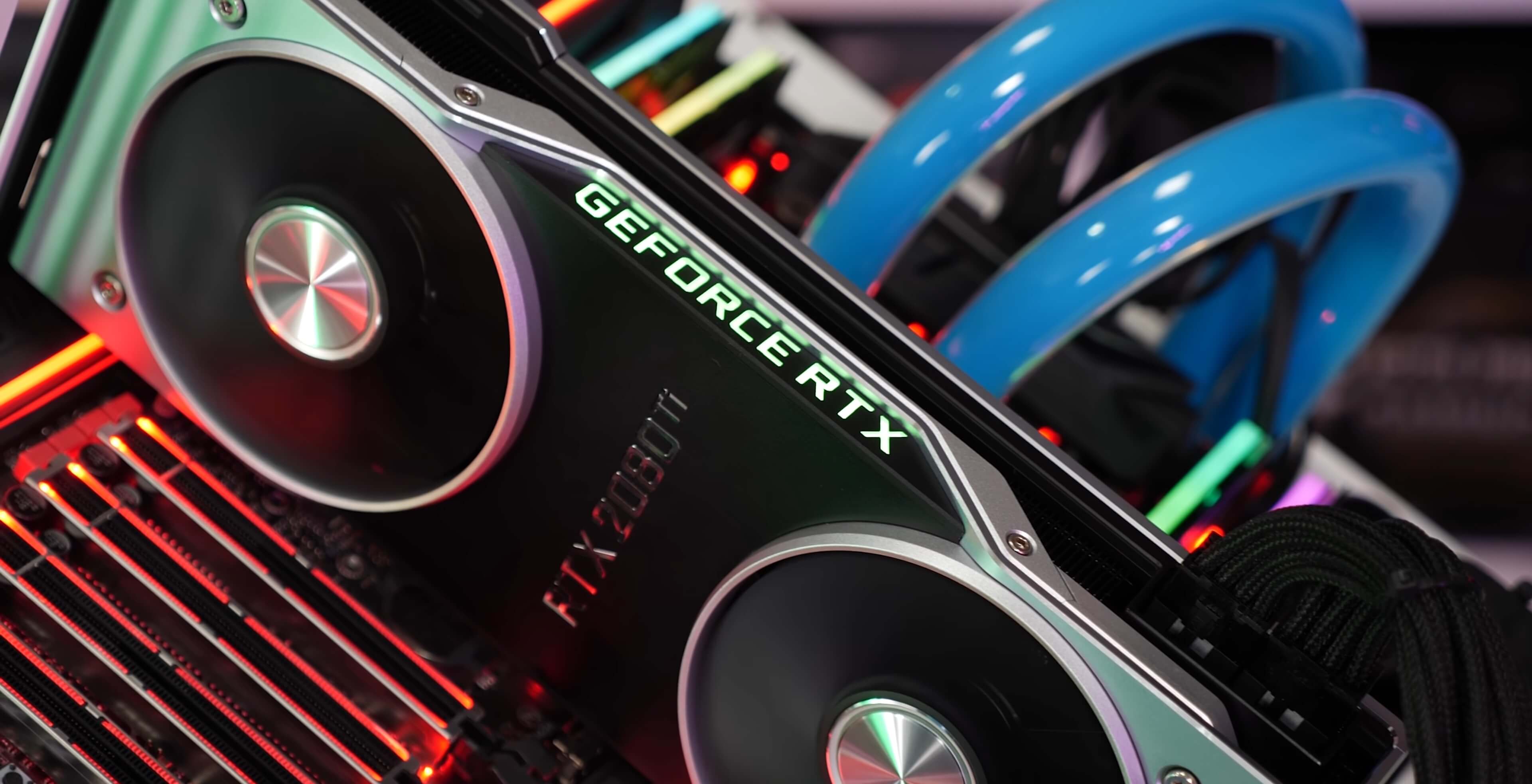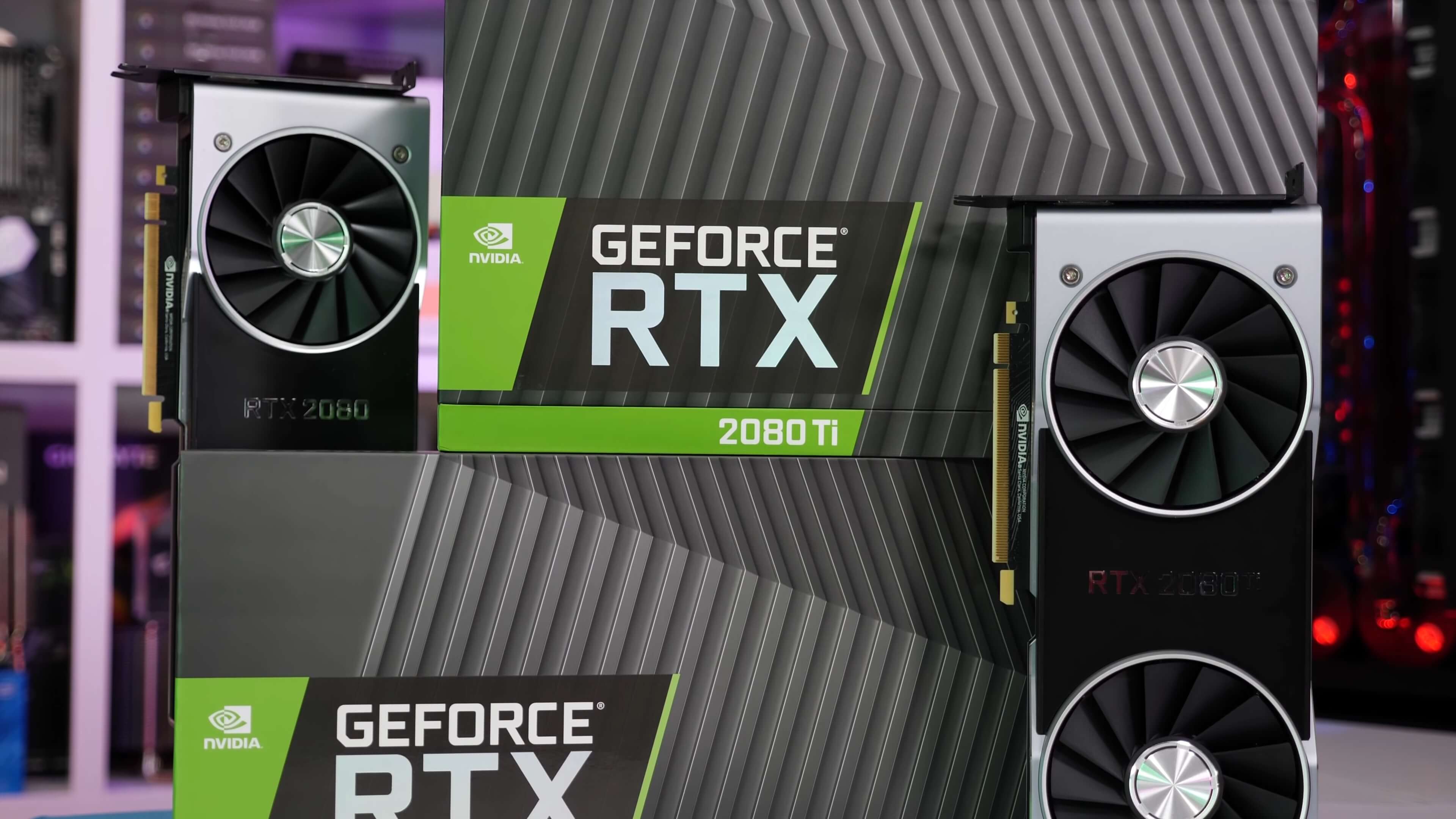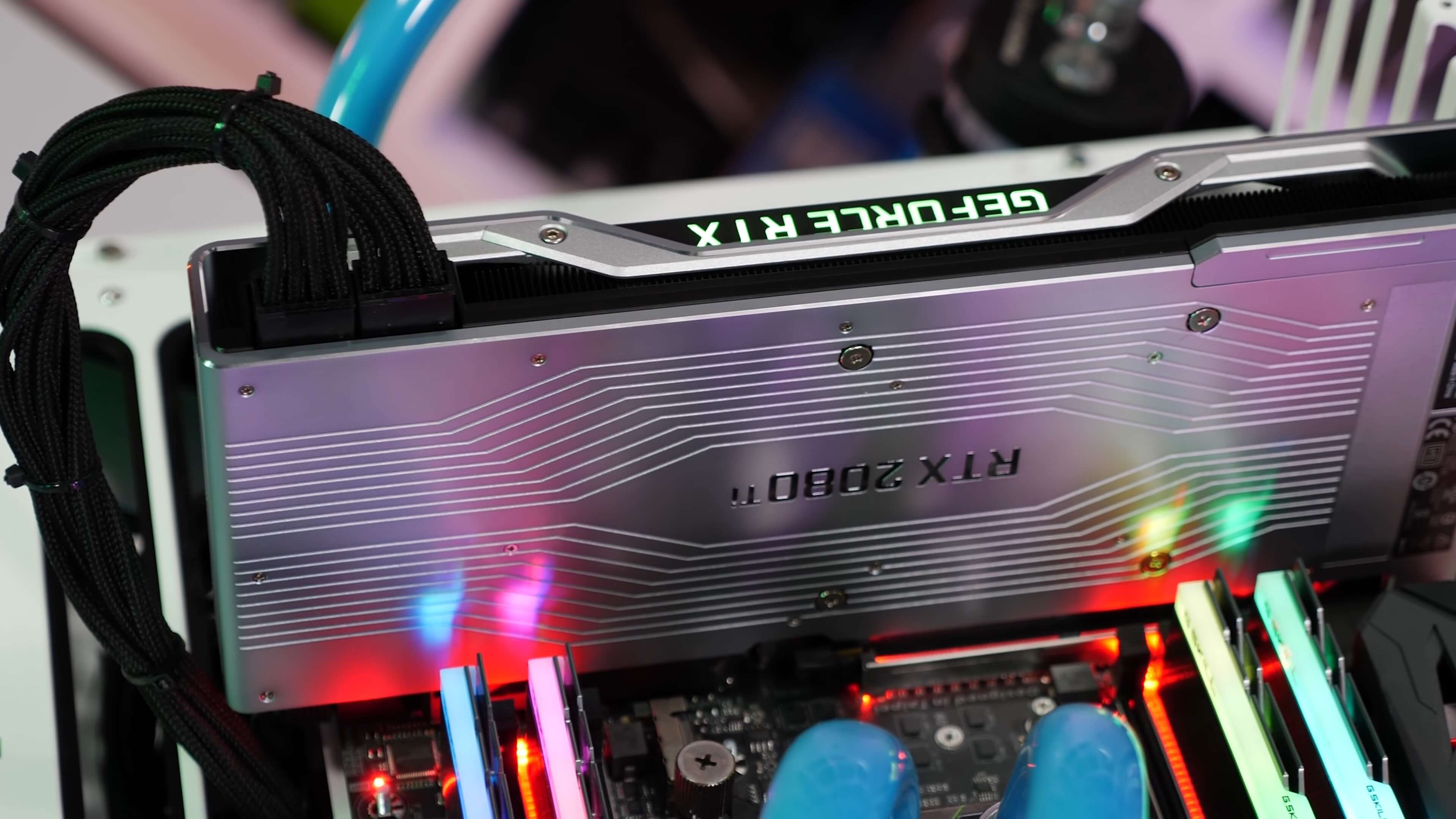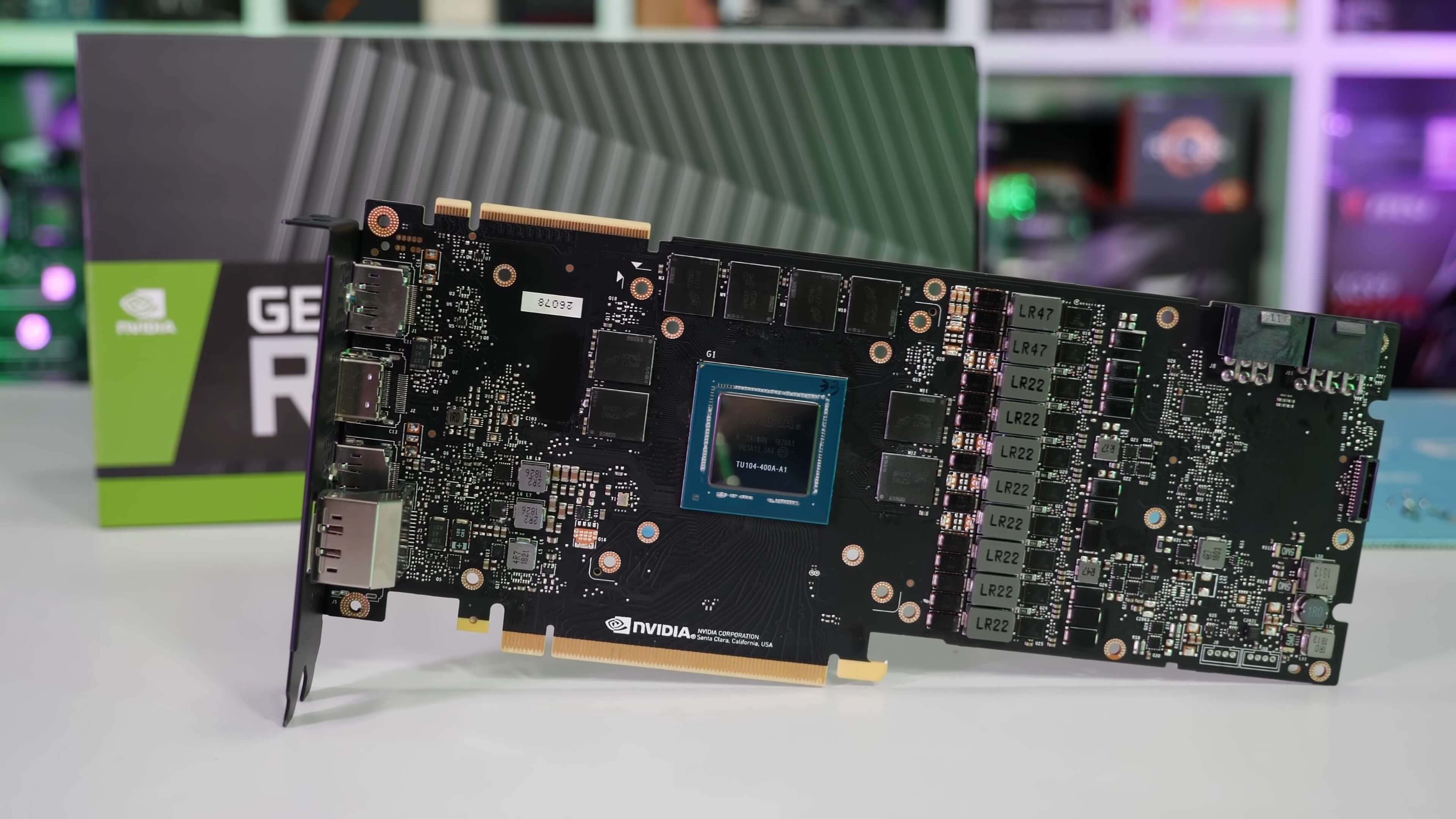After a month-long wait since Nvidia unveiled the GeForce RTX 20 series, we can finally bring you our performance review. As you all know by now, we have a new flagship graphics card in the GeForce RTX 2080 Ti with pricing starting at $1,000 for partner cards and $1,200 for the Founders Edition version, we're talking Titan X money here.
Meanwhile the vanilla RTX 2080 is landing at $700 for partner models and $800 for the Founders Edition. Later next month we'll also get the RTX 2070 at $500 or $600 for the FE card. This means gamers are looking at somewhere between $100 and $300 more for an equivalent model from the previous generation. On top of that, the Founders Edition models carry a further $100 to $200 price premium, and just know these will be the only models in stock from time to time.
Nevertheless it's worth noting that graphics card prices are down to regular levels. After a year of inflated prices due to indirect mining demand, the now two-year old GTX 1080 which currently sells for less than its $500 MSRP, was reaching nearly $1,000 at one point in early 2018. Thankfully for gamers, the craze is now over. We'll discuss RTX 20 series pricing and availability in better detail towards the end of the review. For now let's get the specs out of the way and then jump into the benchmarks.
Based upon Nvidia's Turing architecture, and as the RTX in the name suggests, Ray Tracing is all the rage now. Basically what we have here is a type of hybrid rendering that combines ray tracing with traditional rasterization, so along with the new Tensor Cores we're also getting "RT cores."
Nvidia states that the fastest GeForce RTX model can cast 10 Billion rays per second, which compared to the unaccelerated Pascal is a 25x improvement in ray tracing performance. However today's games don't use ray tracing as it's extremely slow on current hardware, so it's hard to say exactly what the benefits of hybrid rendering will be. Utimately that will depend on how future games implement the technology, which we'll touch more on towards the end of the review.
The flagship RTX 2080 Ti packs 4352 CUDA cores, a 21% increase over the 1080 Ti. This along with the Tensor and RT cores has seen the GPU die size increase by a massive 60%, partly explaining why this part is so damn expensive. Although these new GPUs are manufactured using TSMC's 12nm "FinFetNvidia" process, it's basically just 16nm with a larger reticle limit. Performance wise they are identical according to TSMC which explains the clock speeds.
Speaking of which, the 4352 cores are clocked at a base frequency of 1350 MHz with a boost clock of just 1545 MHz, which is comparable to the 1080 Ti. I should note that the FE model is overclocked to a boost of 1635 MHz. Then using 11GB of 14 Gbps GDDR6 memory on a 352-bit wide memory bus the card has a memory bandwidth of 616.0 GB/s.
The GeForce RTX 2080 comes with 2944 CUDA cores, a base clock speed of 1515 MHz and a boost clock of 1710 MHz, 1800 MHz for the FE model. It uses the same 8GB of 14 Gbps GDDR6 memory but on a slimmer 256-bit wide bus for a bandwidth of 448.0 GB/s.
As noted earlier the 2080 Ti packs 10 Giga Rays per second, this figure has been reduced by 20% for the standard 2080 down to 8 Giga Rays per second. Then the RTX 2070 to come later next month packs 6 Giga Rays per second, a 40% reduction from the flagship. At this point we have no idea what this means. Is 6 Giga Rays per second going to be useful? Only time will tell.
For testing we're using a Core i7-8700K clocked at 5GHz and 32GB of Vengeance DDR4-3400 memory. For the AMD GPUs I've used the Radeon Adrenalin Edition 18.9.1 driver and for Nvidia the GeForce 399.24 driver, while the new GeForce GTX 20 series GPUs will be using driver version 411.51. In total we have a dozen games to go over along with a few other tests. Let's get to the results.
Benchmarks
Editor's note: Also check out our day 2 follow-up mega 35 game benchmark feature.
Starting with the Battlefield 1 1440p results we see that the RTX 2080 is able to deliver GTX 1080 Ti like performance, initially I was worried that the 2080 would be slower than the 1080 Ti, placing it between the 1080 and 1080 Ti. Thankfully it's better than that and here we see it delivering 27% more performance when comparing the average frame rate, 23% for the frame time result.
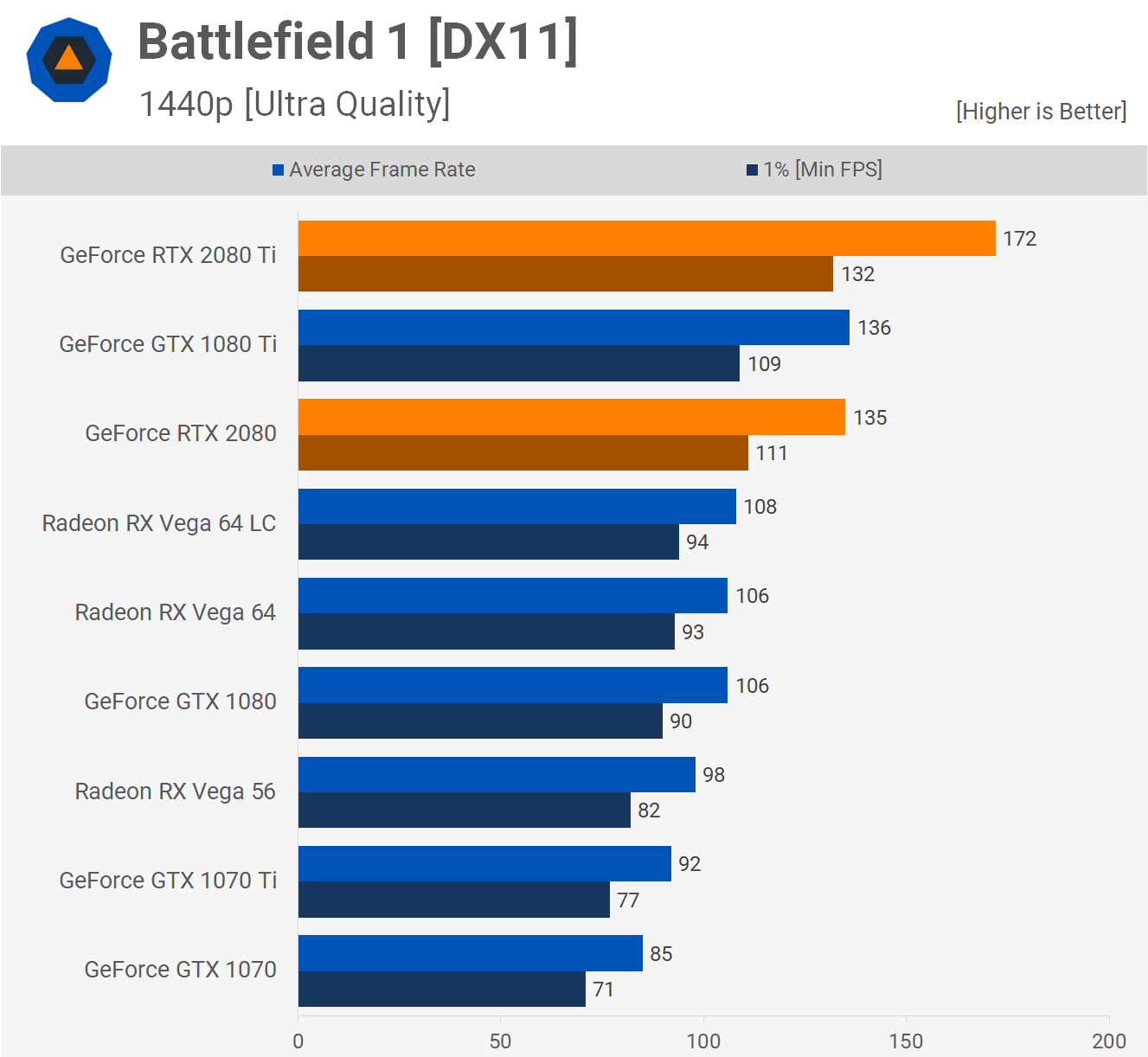
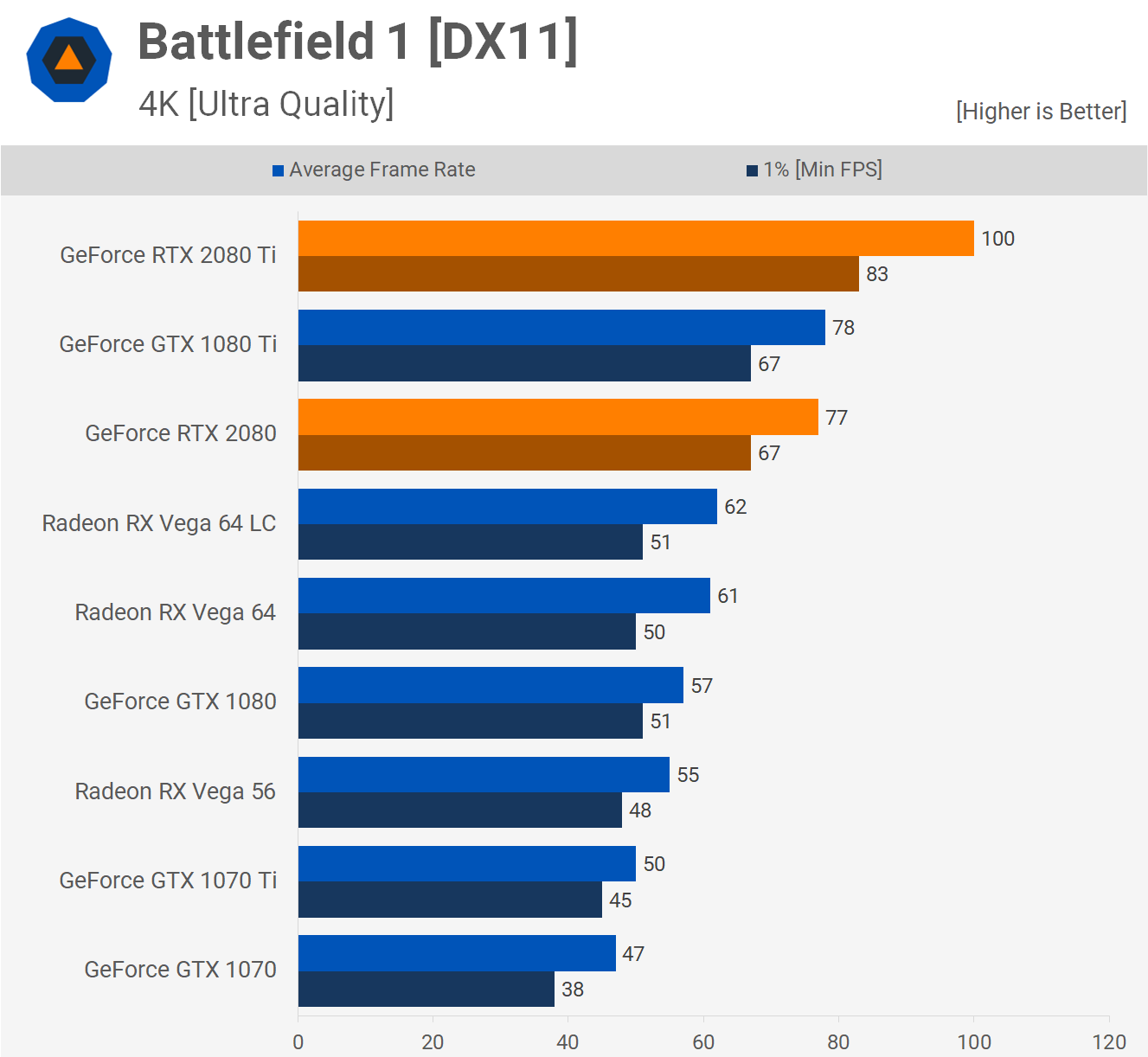
The 2080 Ti is an absolute beast here, beating both the 2080 and 1080 Ti by over a 25% margin. Pretty incredible stuff, but let's move on to 4K. Here the GTX 2080 like the 1080 Ti was able to provide playable performance, rendering 24% more frames on average when compared to AMD's Radeon RX Vega 64 Liquid.
But it was the 2080 Ti that again blew us away with an incredible 100 fps on average, at 4K, in Battlefield 1, using the ultra quality settings. The frame time performance of the 2080 Ti was higher than that of the 1080 Ti's average frame rate.
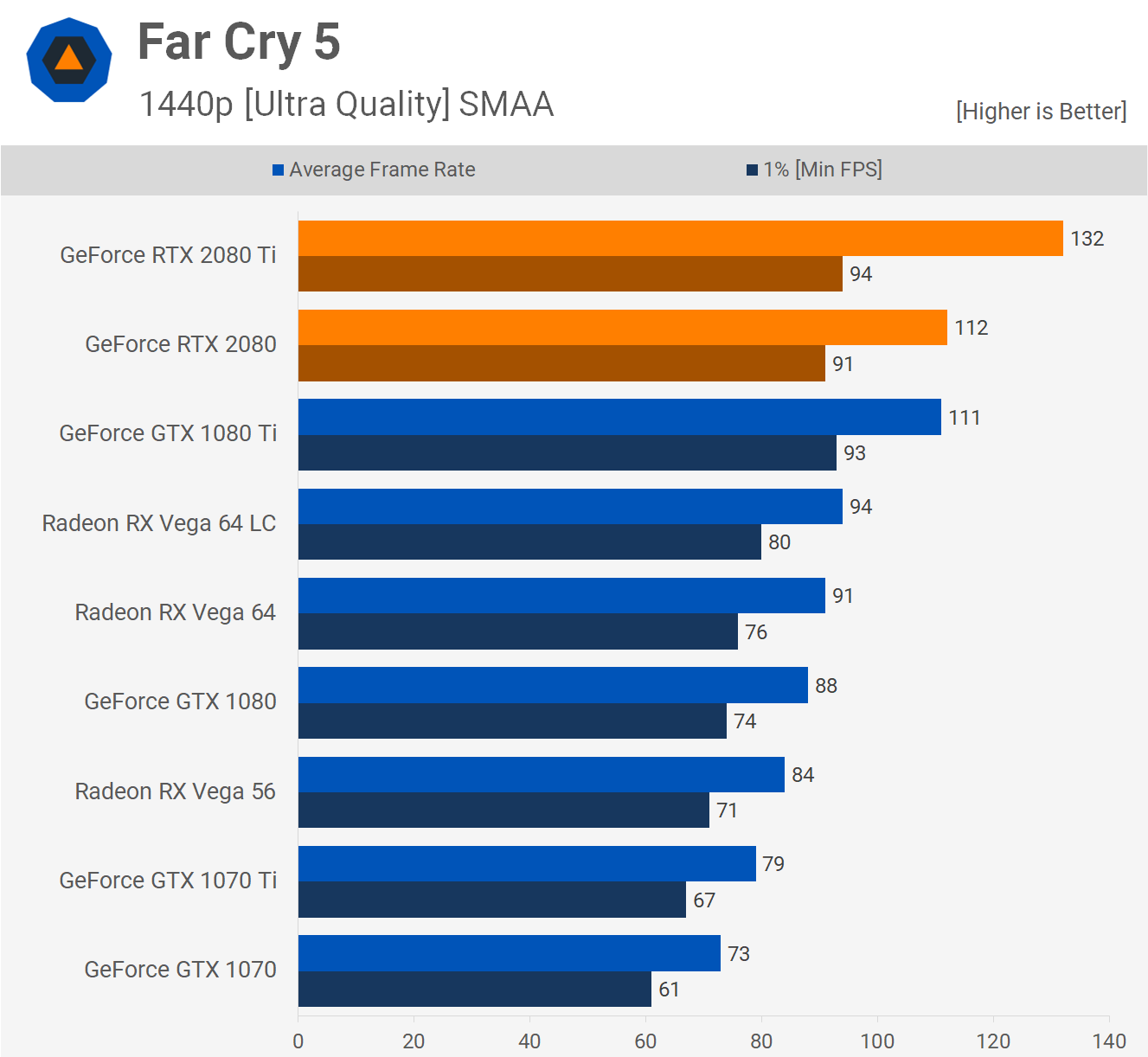
Moving to Far Cry 5 and again we see the RTX 2080 mirroring the GTX 1080 Ti's performance with 112 fps on average, making it 27% faster than the GTX 1080.
As for the 2080 Ti, that pushed the average frame rate out to 132 fps, but we are clearly running into a system bottleneck here as the frame time performance is similar to that of the 1080 Ti.
Who would have thought that at 1440p using ultra quality settings a 5GHz 8700K would be holding things up.
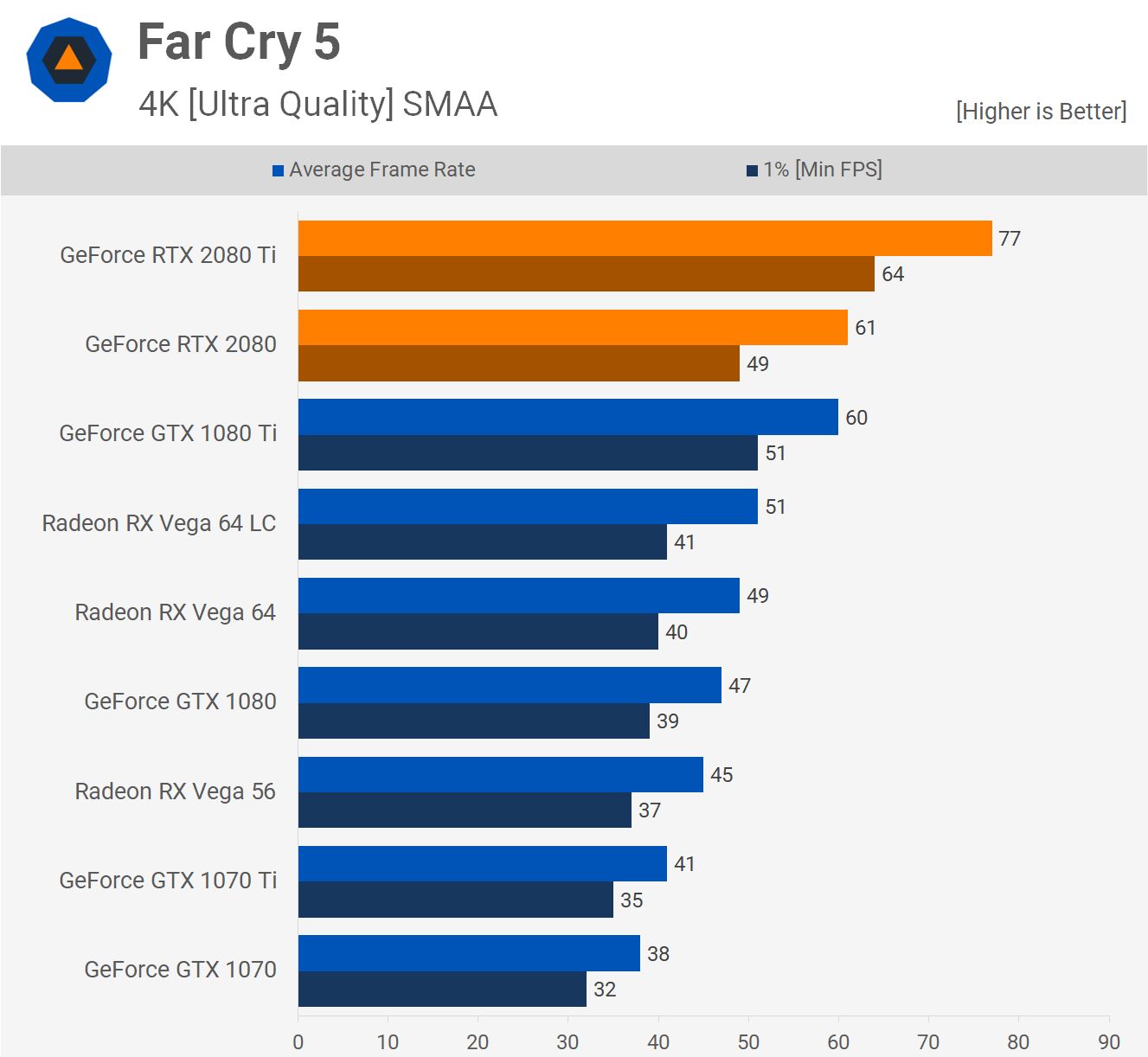
Moving to 4K relieves the system bottleneck and now the 2080 Ti is 28% faster than the 1080 Ti on average and 25% faster for the frame time result. The 2080 is also 30% faster than the GTX 1080. That said, while the 2080 does average 61 fps you will notice dips below that, of course it's still very playable but for a silky smooth experience the 2080 Ti is truly breathtaking.
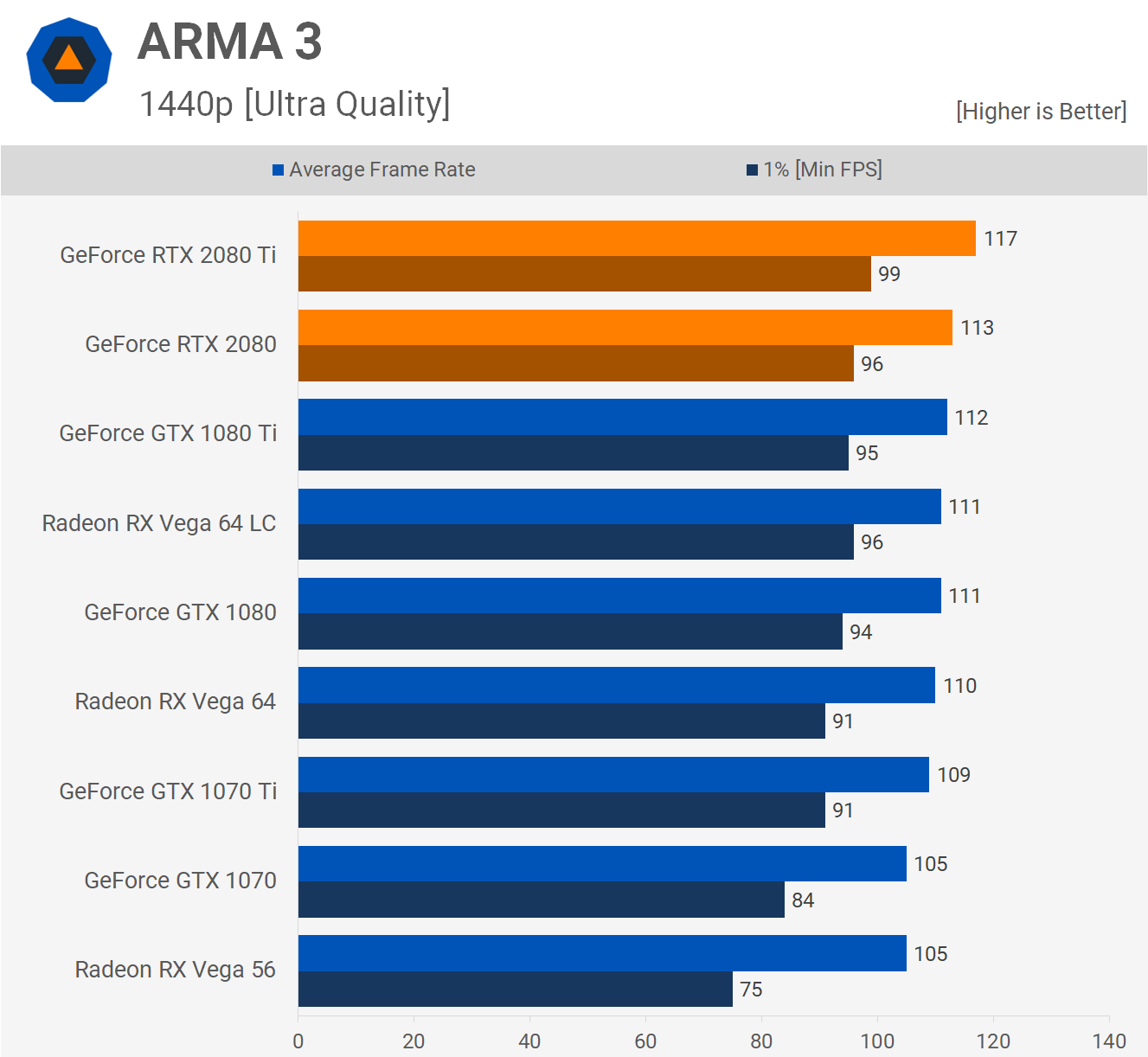
Next up we have ARMA 3, a title that's always heavily requested. Now at 1440p we're certainly not GPU bound, it's quite clear there is some kind of system bottleneck or possibly even a limitation with the game. So we'll have to move to 4K to see what the new RTX GPUs can offer there.

Right, so at 4K we see a drop in performance for the 2080 Ti when compared to the 1440p numbers. This means it's now ~11% faster than the 1080 Ti. Meanwhile, the 2080 is 27% faster than the GTX 1080 and that's a pretty serious margin right there.

Moving along we have some Grand Theft Auto V results and again I know this is a seriously old title but it's still very popular and you guys seem to lose you mind if I don't include it, so in an effort to keep the peace here are the results. Also please note the game has been maxed out, including the advanced graphical settings.

Despite that we're seeing a pretty heavy system bottleneck at 1440p so these results are somewhat useless, though they do inform us that if you're a massive GTAV fan and only play at 1440p then the RTX series won't provide a notable performance boost.
Once again it's the 4K resolution that helps separate the RTX's from the GTX's. Here the 2080 Ti was 37% faster than the 1080 Ti, and that's a seriously nice gain. We also see that the 2080 roughly matched the 1080 Ti, placing it well ahead of the vanilla 1080, in fact it was almost 50% faster, so an amazing result here.
